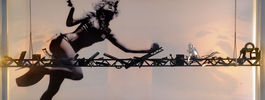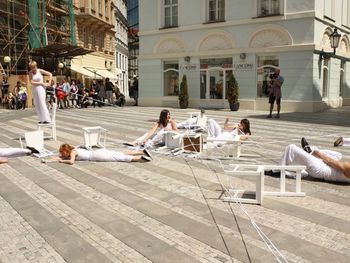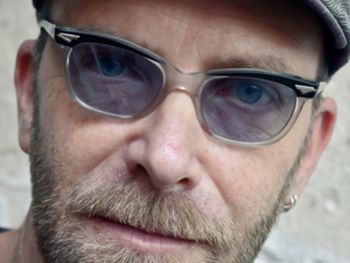PQ 2015
Hot News
THE INTERNATIONAL EXHIBITION: Countries and Regions
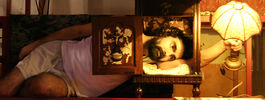
An exhibition of a thousand theatre artists from 60 countries and regions.
SHAREDSPACE 2013- 2016
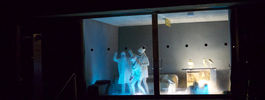
Art and research project presents symposiums, workshops or exhibitions in 11 countries.
OBJECTS
Objects and their stories – this is the main theme of “Objects”, an exhibition open to individual artists.

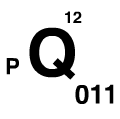
1971 » German Democratic Republic » Stage design and costumes
| Curator: | Gerhard Heinemann |
| Authors of Theme: | Dietrich Dorfstecher |
NĚMECKA DEMOKRATICKÁ REPUBLIKA
The contribution of the German Democratic Republic to the Prague Quadrennial 1971 intends to be more than a gallery of fine pictures only. Not that the painting or graphic attraction — that can be conveyed by design — was to be disregarded. On the contrary: to be a perfect master of painting and graphic techniques is quite a natural precondition of the stage designer´s art, and the artistic creation of a design — if we leave out of account the purely pictural impression — demonstrates its value not until on the stage. The visitor to such an exhibition, however, should be given the opportunity to compare the draft with the finished product, the designer solely aims at. Therefore special attention has been focussed on the presentation of models and photos, yet on original details as well, such as costumes, masks and properties. The excellence and the beauty of the sketch itself depends solely on the craft of the designer; the result of the collective work, however, is of decisive importance for the final effect: it is dependent upon the stage director, the workshops and last but not least upon the time and the financial means being available for the preparation of a performance at a theatre. But not only the way from the final draft to the performance constitutes a collective process being influenced by a number of factors. Already the development of sketches for a character has the form of a team-work — or ought to have it. In some characteristic cases we have included first sketches, experimental variants and also legends of projects, in order to demonstrate in full the process of development that comes about through the co-operation of the stage and costume designer with the stage director and the dramaturgist, with the technicians, and — last but not least with the actors. This style of work proves that „there is no recipe for the finding of a set" (Andreas Reinhardt). The ways are individual and the results as view. Nevertheless there is one thing in common: from the variety of individual styles a „realistic way of writing" (B. Brecht) results for the theatre of socialist Germany as a fundamental point of view. The socialist realism stands the test as an efficacious method within the scope of stagy work. The stage designers choose from the abundance of means being today at their disposal those which hold a great social efficacity and discover new ones. The correspondence with the audience during the performance but also during the preparatory phase of the productions is developing more and more into a significant element. Not only the work of big theatres is on show at our exhibition. Mediumsized and small theatres, too, are represented, which often, under difficult conditions, succeed in managing a large-scale production. Information on the size and the audience of these theatres enable the viewer to assess their work. The arrangement of the GDR exposition is governed by the character of the plays: it puts together sets to plays of kindred kind and origin. But this arrangement facilitating the comparison between various stage-set solutions has not been strictly ca m e d through; in some cases it has been deliberately broken in order to display the work of a single theatre on the whole. An exhibition of sets — all the more so as it is accompanied by an exhibition of theatre architecture — is according to its nature always a theatre exhibition. Thus our contribution conveys not only an impression of the stage design concerns in the German Democratic Republic but on the whole gives an insight into the theatre scenery of the socialist German state.
Exhibiting artists / ateliers
[show all | hide all]- Achim Freyer
-
Sean O´Casey: (The Shadow of a Gunman ),
Magdeburg
1969
-
Gioacchino Rossini: (The Barber of Seville),
Deutsche Staatsoper
1968
- Karl von Appen
-
Bertolt Brecht: (Saint Joan of the Slaughter-House),
Berliner Esemble
1968
-
: (Woyzeck),
Berliner Esemble
1970
-
Bertolt Brecht: (The Bread-Shop),
Berliner Esemble
1967
- Dieter Berge
- Rolf Döge
- Peter Friede
- Manfred Grund
-
Williame Shakespeare: (The Merry Wives of Winsdor),
Volksbohne
1967
- Franz Havemann
-
F. de Rojas: (Celestine),
1970
-
Henrik Ibsen: (Peer Gynt),
1970
- Pieter Hein
-
Alexander Ostrovsky: (The Forest ),
Volksbuhne
1969
- Theo Hug
-
H. Solomon: (Soudruh otec),
Gera
1969
- Otto Kähler
-
Theater der Freunschaft: (Kocour v botách),
1969
- Heinrich Kilger
-
Euripides - M. Braun: (Trojan Women),
Deutsches Theater
1969
-
R. Keiser: (Mesaniello),
Detsches Staatsoper
1967
-
H. Salomon: (A Rouge),
Deutsches Theater
1967
-
Williame Shakespeare: (Troilus and Cressida),
1966
- Andreas Reinhardt
-
H. Baierl: (Jean of Dobeln),
Berliner Esemble
1969
-
Johann Wolfgang Goethe: (Faust I.),
Deutsches Theater
1968
-
P. Dessau - H. Muller: (Lancelot),
Deutsche Staatsopera
1969
-
Carl Maria von Weber: (The Freeshooter),
Deutsche Staatsoper
1970
- Eberhard Söhnel
-
Aischilos - M. Braun: (The Persians),
1968
- Thekla Tesch
- Walter Wallbaum
-
F. Bauer: (Baran or The People of the Village),
Kammerspiele
1967
-
A. Suassuna: (The Testament of the Dog),
Kammerspiele
1968
-
V. N. Bill - Bělocerekovskij: (Moon from Left),
Arbeitertheater Kabelwerk
1967
-
A. Fauquez: (Barberousse or The Island of Sunflowers),
1968
- Falk von Wangelin
-
A. Štejn: (Between Two Thunderstorms),
1970
- Wilfried Werz
-
N. Rimskij - Korsakov: (The Golden Cock),
Deutsche Staatsoper
1968
-
Dmitrij Šostakovič: (The Nose),
Deutsches Staatsoper
1970
- Ralf Winkler
-
O. von Horvath: (Kasimir and Karoline),
1969
-
M. Šatrov: (Bolcheviks),
1969
-
Friedrich Schiller: (Cabal and Love),
1969
- Reínhart Zimmermann
-
H. W. Henze: (The Young Lord),
Komische Oper
1968
-
G. Gerschwin: (Porgy and Bess),
Komische Oper
1970
- Annemarie Rost
-
Maxim Gorkij: (Vassa Železnovova),
Maxim Gorkij Theater
1970
- Gerhard Arnold
-
Carlo Goldoni: (The Servant of Two Masters),
Theater des Freunschaft
1969
- Eberhard Bleichert
- Joachim Bober
- Frank Borisch
-
: (The Hall),
1969
- Christiane Dorst
-
: (Romulus the Great),
1969
- Alwin Eckert
-
Carlo Goldoni: (The Servant of Two Masters),
1970
- Jochen Finke
-
Bertolt Brecht: (The Caucasian Chalk Circle),
1968
- Peter Gemarius de Kepper
-
Heinrich von Kleist: (The Broken Jug),
1970
- Lothar Göpfert
- Charlotte Gotthardt
- Gabriele Hähne
-
Alexander Pushkin: (Eugene Onegin),
1970
- Gunter Kaiser
- Dieter Lange
-
Sean O´Casey: (A Pound on Demand ),
0
- Horst Leiteritz
-
J. Haufe: (Maria Theresia Schulze),
Cottbus
1968
- Dagmar Melchers
-
R. Zechlin - G. Deicke: (Reinke the Fox),
1969
-
J. Švarc: (The Bewitched Brothers),
1970
- Edda Naumann
-
H. Henze: (The Young Lord),
1970
- Horst Sagert
-
Bertolt Brecht: (Turandot),
Sauchspielerhaus
1969
- Lothar Scharsich
-
S. Pfaff: (Regina B.),
Maxim-Gorki-Theater
1969
- Christine Schmutzler
-
Giuseppe Verdi: (Othello),
Cottbus
1968
-
Jean-Baptiste Molière: (School for Wives),
Cottbus
1967
- Elisabeth Selle
- Erika Simmank-Heinze
- Christine Stromberg
-
Giacomo Puccini: (La Bohéme),
Deutsche Staatsoper
1967
- Peter Sykora
-
Dario Fo: (Steal a bit less!),
1970
-
J. Švarc: (The Shadow),
Gerhart - Hauptmann - Theater
1969
- Manfred Voigt
- Volker Walther
-
Federico García Lorca: (The House of Bernarda Alba),
Mecklenburgisches Staatstheater
1970
- Fritz Werner
- Eleonore Kleiber
-
Giuseppe Verdi: (The Force of Destiny),
Komische Oper
1971
-
H. Henze: (Ondine),
Komische Oper
1970
Specialization: director, set designer, costume designer
Additional information: Born in 1934. Began as industrial designer, master student of Bertolt Brecht, then stage designer. Presently, he cooperates with Burgtheater Wien, Opera Leipzig, Demut La Monnaie Brussels, Opera National du Rhin Strassbourg, Festival of Schweitzingen, Bavarian State Opera Můnchen, Festival of Salzburg and Teatro Nacionál de Don Carlos Lisbon. He exhibited at the PQ in 1975 and 1979. In 1998 he received the Award of the ITI for the World Theatre Day.
Exhibiting works
Additional information: Born in 1900 in Düsseldorf. In the years 1920 - 1924 he studied painting and graphics under F.K. Delaville at the Academy of Arts in Frankfurt am M. Since 1926 he worked in Berlin and since 1929 in Dresden. In 1933 he was barred from professional activities by the Nazis and in 1941 - 1945 he was a prisoner in a concentrations camp for his illegal political activities. In 1945 - 1954 he was the chief stage designer at the State Theatre at Dresden and in 1947-49 he was the theatre' s superintendent. He is the founder and chief of the department of stage design at the Academy of Fine Arts in Dresden. Since 1954 he is the chief stage designer of the Berliner Ensemble, where he has collaborated with stage directors Bertolt Brecht, Benno Besson, Erich Engel, Fritz Kortner, Peter Palitsch, Joachim Tenschert, Manfred Werkwerth and others. In 1960 he became a full professor and in 1961 a member of the German Academy of Art. In 1956 and 1969 he received a State Prize of the German Democratic Republic and in 1975 he received the Order of Karl Marx. He participated in the Prague Quadrennial in 1967, in 1971 and in 1975; he received the PQ Gold Medal in 1967.
Obrázky z kataloguExhibiting works
Additional information: Born 1927 at Dresden. Studied at Dresden and in Berlin. He worked at the Berliner Ensemble under prof. Karl von Appen. He is chief designer of the Maxim—Gorki—Theater in Berlin.
Obrázky z kataloguAdditional information: Born 1925 at Leipzig where he completed his studies at the Arts and Crafts School. Later on he became the assistant etage designer at the Leipzig Opera House, and thereafter the stage designer at the Theatres at Altenburg, Erfurt, Halle and Dresden. For a number of seasons he acted as art director of the Händel Festival at Halle. At present he is at work as stage designer of the Landesbůhnen Sachsen at Radebeul near Dresden.
Obrázky z kataloguAdditional information: Born in 1938 at Chemnitz (Karl-Marx-Stadt). Between 1952 and 1955 ne was at work as theatre painter, subsequently as assistant stage designer and stage designer at the Municipal Theatre in Karl-Marx-Stadt, thereafter chief designer of this theatre. Since 1967 he acts as chief designer at the State Theatre in Dresden.
Obrázky z kataloguAdditional information: Born in 1929 in Dresden. In the years 1948 - 1954 he studied under Karl von Appen at the Academy of Fine Arts in Dresden. After graduation he worked in Zittau, in the Berliner Ensemble and as chief stage designer of the Berlin Volksbühne. In the years 1971 - 1974 he was a free lance designer and during 1974 - 1977 he was at the State Theatre in Dresden. Since 1977 he is the deputy chief designer at the Berliner Ensemble. He parti - cipated in the Prague Quadrennial in 1967, in 1971 and in 1975.
Obrázky z kataloguExhibiting works
Additional information: Born in 1933 in Neukloster (Mecklenburg). Since 1963 he is the chief stage designer at the German National Theatre in Weimar. He partici- pated in the PQ in 1967, 1971, 1975 and in 1979.
Obrázky z kataloguExhibiting works
Additional information: Born in 1939 in Berlin. In the years 1956 - 1960 he studied at the Academy of Graphic Art at Berlin- Charlottenburg with prof. Willi Schmidt. After graduation he worked at Quedlinburg and at the Berlin Volksbuhne. He became a student of Karl von Appen at the Academy of Art in Berlin and in the years 1964 - 1969 he was at the Berliner Ensemble. He participated in the Prague Quadrennial in 1967, in 1971 and in 1975.
Obrázky z kataloguExhibiting works
Additional information: Born in 1929 at Gera. Between 1945 and 1949 he passed through apprenticeship and practical training at the theatres at Meiningen and Gera. Later on he became stage designer, at the time being he acts as chief designer at the Bühnen der Stadt Gera. He has brought into effect numerous décors also for the theatres at Weimar and Stralsund.
Obrázky z kataloguExhibiting works
Additional information: Born in 1910 in Lübeck. He was originally a cabinet maker in a theatrical workshop. Later he became a stage designer in Brieg and Güstrow. In the years 1945 - 1948 he was superintendent at the Municipal Theatre at Güstrow, in 1948 - 1950 the chief of all workshops at the Mecklenburg State Theatre in Schwerin. In 1950-1953 he worked in adult education in the local administration in Berlin, in the years 1953 - 1959 he was the chief stage designer at the Hans-Otto Theatre in Potsdam and in 1959-1977 the chief stage designer at the Friendship Theatre in Berlin . In 1966 he received a State Prize of the G. D. R. /as a member of a collective/ and in 1975 he received the Critics Award of the journal Berliner Zeitung. Since 1967 he is a member of the stage design commission of OISTT and since 1975 president of the OISTT section in the German Democratic Republic and chairman of an ad hoc committee on stage design. He participated in the Prague Quadrennial in 1967, in 1971 and in 1975.
Obrázky z kataloguExhibiting works
Additional information: Born in 1907 in Heidelberg. Slnce 1948 chief designer of the Deutsches Theater in Berlin and head of the stage design chair at the College of Plastic and Applied Arts in Berlin- Weissensee. Professor, member of the German Academy of Arts in Berlin. He died in 1970 in Berlin.
Obrázky z kataloguExhibiting works
Additional information: Born in 1937 at Meissen (Saxony). Apprenticeship as a theatre painter. He worked as assistant stage designer at the Landesbűhnen Sachsen at Radebeul. From 1961— 1962 he acted as stage designer at the theatre at Zittau. Between 1962 and 1964 he was disciple of prof. Karl von Appen at the German Academy of Arts in Berlin. Between 1964 and 1966 he has been at work as assistant stage designer and since .1966 as stage designer at the Berliner Ensemble. His important stage sets: Purple Dust (0'Casey), Berliner Ensemble 1966; Herr Puntila and his Servant Matti (Dessau- Brecht), Deutsche Staatsoper 1966; Le Misanthrope (Moliēre), German Television 1966, Elektra (Richard Strauss), Deutsche Staatsoper 1967; Vietnem-Diskurs (Weiss), Berliner Ensemble 1968.
Obrázky z kataloguExhibiting works
Additional information: Born in 1933 at Niederlichtenau. Apprenticeship as glass painter. Between 1952 and 1960 he studied stage design art under prof. Reichard at tne College of Plastic and Graphic Arts at Dresden. He was at work as stage designer from 1960—1961 at the theatre at Görlitz, between 1961 and 1963 at the Landesbűhnen at Radebeul (near Dresden), between 1963 and 1966 at the German National Theatre at Weimar. Since 1966 he is chief designer of the Landesbűhnen Sachsen. He has created more than 150 sets for opera, drama, ballet and for television performances.
Obrázky z kataloguExhibiting works
Additional information: Born in 1939 at Schneideműhl (Saxony). Between 1958 and 1963 she studied stage design art under prof. Heinrich Kilger at the College of Plastic and Applied Arts in Berlin—Weißensee. Between 1963 and 1966 she was at work as stage designer at the Hans—Otto—Theater at Potsdam, and between 1967 and 1970 at the Municipal Theatres in Karl—Marx—Stadt. At present she acts as assistant stage designer at the Volksbűhne in Berlin.
Additional information: Born in 1934 at Walbeck (near Haldensleben). Between 1953 and 1958 studied stage design art under prof. Heinrich Kilger at the College of Plastic and Applied Arts in Berlin-Weissensee. Between 1958 and 1962 he was at work as film architect at the studio for trick films at Dresden. From 1962—1963 he acted as assistant stage designer at the Volksbühne in Berlin, and since 1963 he has been at the Deutsches Theater in Berlin.
Obrázky z kataloguExhibiting works
Additional information: Born in 1939 in Guhlau. In the years 1959 - 1964 he studied at the Academy of Fine Arts in Dresden under prof. Reicherd. He has worked for theatres in Rostock, Halberstadt and Dresden. At present he works as a stage designer in the Volkstheatre in Rostock. He participated in Prague Quadrennial in 1967, in 1971 and in 1975.
Exhibiting works
Additional information: Born in 1930 in Dresden. Since 1965 he is the chief stage designer at the State Opera in Berlin. He participated in the PQ in 1967, 1971, 1975 and in 1979.
Obrázky z kataloguExhibiting works
Additional information: Born in 1936 in Chemnitz /Karl-Marx-Stadt/, during 1954-57 he was an apprentice, learning the craft of set painter in the Municipal Theatres in Karl-Marx-Stadt. Between 1957-1962 he studied under prof. Heinrich Kilger at the Academy of Fine and Applied Arts in Berlin-Weissensee. From 1962 to 1964 he was a stage designer in the Municipal Theatre in Leipzig, from 1964 to 1967 chief designer at the Hans-Otto-Theater in Potsdam. Since 1967 he has been the chief designer at the Municipal Theatres in Karl-Marx-Stadt. He participated in the Prague Quadrennials in 1967 and in 1971.
Obrázky z kataloguExhibiting works
Additional information: Born in 1936 in Erfurt. Since 1962 he is the chief stage designer at the Komische Oper in Berlin. He participated in the PQ in 1967, 1971, 1975 and in 1979.
Obrázky z kataloguExhibiting works
Additional information: Born in 1924 in Dresden. In the years 1947 - 1951 she studied at the Academy of Fine Arts in Dresden with Karl von Appen . She made her debut in the Berliner Ensemble and then worked in the Maxim Gorki Theatre and in the German Theatre in Berlin . Since 1976 she is the chief of the costume department of the Berliner Volksbühne. She participated in the Prague Quadrennial in 1971 and in 1975.
Exhibiting works
Additional information: Born in 1939 in Aue. He was assistant to Otto Kahler at the Hans-Otto-Theater in Potsdam; between 1959 and 1961 an assistant stage designer at the Volksbühne in Berlin, under Roman Weyl. Between 1961 and 1969 he was a stage and costume designer at the Volkstheater in Rostock, from 1966 to 1967 at the Municipal Theatres in Magdeburg and after 1967 at the Friendship Theatre /a theatre for children and youth/. At present he is the chief designer of the Municipal Theatre in Rudolstadt. He participated in the Prague Quadrennial in 1971.
Obrázky z kataloguExhibiting works
Additional information: Born 1920 at halle (Saale). After 1945 he worked as a mason and joiner. Between 1949 and 1953 he studied scenic design under prof. Heinrich Kilger in Berlin - Weißensee. Between 1953 and 1966 he was chief designer of the theatre at Senftenberg, since 1966 he is chief designer of the Friedrich—Wolf—Theater at Neustrelitz. He is at work for other theatres, too, and for the television. He was awarded the Paul-Blechen Prize.
Obrázky z kataloguAdditional information: Born in 1940 in Wermigerode. Between 1953 and 1961 he studied at the State Dramatic School in Berlin under the direction of prof. Wolfgang Heinz (the line of dramatic art). Since 1961 play-actor and assistant stage director at the Deutsches Theater in Berlin (head manager prof. Wolfgang Langhoff). Between 1964 and 1967 he studied stage designing under prof. Heinrich Kilger at the College of Plastic and Applied Arts in Berlin-Weißensee. Since 1968 he is at work as stage designer and actor at the Landestheater at Halle (head manager Gerhard Wolfram).
Obrázky z kataloguAdditional information: Born in 1941 in Dresden. He studied at the Academy of Fine Arts in Dresden, where he graduated in 1965. After graduation he worked at the Friedrich-Wolf-Theater in Neustrelitz. Since 1968 he is a stage designer at the Municipal Theatres in Magdeburg. He participated in the Prague Quadrennial in 1971.
Obrázky z kataloguExhibiting works
Additional information: Born in 1939 in Babelsberg. Between 1957 and 1962 she studied at the Academy of Fine and Applied Arts in Berlin-Weissensee under prof. Heinrich Kilger. Between 1962 and 1968 she was a stage and costume designer at the Hans-Otto-Theater in Potsdam. In 1968 she became costume designer at the Municipal Theatres in Leipzig. At present she is a costume designer for the DEFA film company in Potsdam-Babelsberg. She participated in the Prague Quadrennial in 1971.
Obrázky z kataloguExhibiting works
Additional information: Born in 1937 in Pazuchy in Poland. He first completed his apprenticeship as a house-painter and in the years 1956 - 1959 studied at the Vocational School of Applied Arts in Leipzig.Later he worked as a set painter and as an assistant designer . In the years 1965 - 1970 he studied at the Academy of Fine and Applied Arts in Berlin-Weissensee under prof. Kilger. After graduation he worked at Karl-Marx-Stadt and at Potsdam and since 1976 he is a free lance stage designer. He participated in the Prague Quadrennial in 1971 and in 1975.
Obrázky z kataloguExhibiting works
Additional information: Born 1941 in Glogau. Since 1980 he has been working as chief stage designer at the Volksbűhne Theatre in Berlin. He participated in the Prague Quadrennial in 1971, 1975, 1979 and 1987.
Obrázky z kataloguExhibiting works
Additional information: Born in 1942 at Chemnitz (Karl-Marx-Stadt). He is at work as stage designer at the Municipal Theatres in Karl-Marx-Stadt.
Obrázky z kataloguExhibiting works
Additional information: Born in 1933 at Gera. Assistant stage designer at Gera; he was given instructions in painting and graphic arts by tne artists prof. Neidhart and prof. Günter at Gera. Since 1956 he is at work as stage designer at tne theatre Bühnen der Stadt Gera, and as such he has brought into effect numerous designs for the opera, drama, operetta, ballet, cabaret and for various shows and plays for children. He works for other theatres as well (e. g. in 1961 for the theatre at Karlovy Vary), and he also works as commercial artist (posters).
Obrázky z kataloguAdditional information: Born in 1927 at Annaberg (Saxony). Her studies at the College for Plastic and Graphic Arts at Weimar were interrupted by the war. After 1945 she was at work in the field of handicrafts at Hamburg. She became assistant stage designer at the Landestheater Obererzgebirge at Annaberg, subsequently stage designer at this theatre. Since 1964 she is chief designer at Annaberg.
Obrázky z kataloguAdditional information: Born in 1947 at Cunnersdorf near Sebnitz (Saxony). Between 1964 and 1966 she served her apprenticeship as a clerk; between 1966 and 1969 she studied at the Vocational School of Applied Arts at Heiligendam and graduated there as a costume designer. In the years 1969 — 1971 she has been acting as costume designer and assistant stage designer at the theatre at Greifswald; she carries out scenic designs for the drama, the opera and the operetta. In 1970 she created costume designs for the performance of The Flying Dutchman and Eugen Onegin at the Rostock theatre.
Obrázky z kataloguExhibiting works
Additional information: Born in 1939 at Riesa (Saxony). Between 1958 and 1960 he performed practical work in the workshops of the state theatres in Berlin. Between 1960 and 1965 he studied stage design art under prof. Heinrich Kilger at the College of Plastic and Applied Arts in Berlin-Weißensee. Between 1965 an 1967 he acted as stage designer at the Mecklenburgisches Staatstheater at Schwerin, between 1967 and 1970 as stage designer at the Deutsches Theater in Berlin. He lectures at the College in Berlin-Weißensee.
Obrázky z kataloguAdditional information: Born in 1938 at Dresden. Between 1957 and 1962 he studied stage design art at the College of Plastic and Graphic Arts at Dresden under prof. Reichard. Between 1962 and 1964 he acted as stage designer at Plauen, between 1965 and 1968 in Karl-Marx- Stadt. Since 1968 he has been at work as stage designer at the German National Theatre at Weimar.
Obrázky z kataloguExhibiting works
Additional information: Born in 1926 in Leipzig. Between 1945 and 1948 studied at the Arts and Crafts School in Leipzig. In 1948 he became stage designer at the Theater der Jungen Welt in Leipzig. Between 1949 and 1953 he acted as the assistant of prof. Hans Reichard at the theatre at Greiz, between 1954 and 1980 as stage designer at this theatre. Between 1960 and 1964 he was at work as stage designer in Karl-Marx-Stadt. Between 1965 and 1969 he was chief designer at Zwickau, since 1969 he acts as chief designer of the Theater der Stadt Cottbus. He has been also at various work for the theatres at Plauen, Greifswald, Wittenberg and fer the television (Deutscher Fernschfunk Berlin).
Obrázky z kataloguExhibiting works
Additional information: Born in 1944 in Vienna. Between 1963 and 1968 she studied stage design art at the College of Plastic and Graphic Arts at Dresden. Since 1968 she has been at work as stage designer at the Mecklenburgisches Staatstheater at Schwerin.
Obrázky z kataloguExhibiting works
Additional information: Born in 1940 at Dresden. After havlng completed her studies at the secondary school she did practical work in the workshops of the film company DEFA and of the Landesbůhnen Sachsen. Between 1960 and 1965 she studied stage design art under prof. Reichard at the College of Plastic and Graphic Arts at Dresden. From 1965— 1966 she acted as stage designer at the Volkstheater at Rostock, from 1966—1967 at the Landestheater at Dessau. Between 1967 and 1969 she has been at work as stage designer and since 1969 as chief designer at the Mecklenburgisches Staatstheater in Schwerin.
Obrázky z kataloguExhibiting works
Additional information: Born in 1934 in Dramburg (Pomerania). He works as a graphic artist and stage designer in Berlin. He participated in the PQ in 1967, 1971 (in the exposition awarded by the Golden Triga — the main prize) and in 1979 (where he received a Gold Medal for Stage Design).
Obrázky z kataloguExhibiting works
Additional information: Born in 1939 in Berlin. He was a student with and since 1970 an assistant to prof. Karl von Appen at the Berliner Ensemble. He graduated from the Academy of Fine and Applied Arts at Berlin-Weissensee. His diploma work - the stage and costume designs for Regina B. by Siegfried Pfaff - was realised at the Maxim-Gorki-Theater in Berlin. Since then he has undertaken stage designs for theatres in Prenzlau, Brandenburg and Neustrelitz. During 1974 and 1975 he has been working for the Volksbühne and for the Kammerspiele in Berlin. He participated in the Prague Quadrennial in 1971.
Obrázky z kataloguExhibiting works
Additional information: Born in 1937 at Reichenbach (Vogtland). Aíter having completed the studies at the School of Engineering for Clothing at Reichenbach she was at work as costume designer at the theatres in Brandenburg and Zwickau. Since 1969 she acts as costume designer a the theater der Stadt Cottbus.
Obrázky z kataloguExhibiting works
Additional information: Born in 1919 at Erfurt. Between 1937 and 1939 she studied at the College of Plastic and Graphic Arts at Weimar. After having completed her studies she acted as costume designer and head of the costume department at the theatres at Chemnitz and Weimar. Between 1947 and 1951 she lectured on fashion design at Weimar. Srnce 1951 she has been at work as costume designer at the Municipal Theatres in Leipzig. At that period she performed some works also at the Municipal Stages at Erfurt and at the film company DEFA. She lectures at the Vocational School of Applied Arts in Leipzig. As a guest she was at work at the Great Theatre in Moscow jointly with stage director Joachim Herz (The Flying Dutchman) and at the State Theatre in Brno jointly with stage director Gunter Lohse (Fidelio).
Obrázky z kataloguAdditional information: Born in 1927 in Dresden. Studies of stage design at the College for Fine Arts in Dresden under Karl von Appen. 1953 — 1955 assistant at the Staatstheater Dresden under Karl von Appen and Gerhard Schade. 1955 — 1961 costume designer at the Landesbůhnen Sachsen in Radebeul near Dresden. Since 1961 designs costume for theatres in Dresden and Leipzig. Her most important costume designs are those for the plays Before Sunrise by G. Hauptmann, War and Peace by L. N. Tolstoi — E. Piscator, Othello by W. Shakespeare and for the operas Don Giovanni by W. A. Mozart, Fidelio by L. van Beethoven, Belrothal in a Convent by S. Prokofiev.
Obrázky z kataloguAdditional information: Born in 1928 in Bydgoszcz. Between 1948 and 1950 she studied at the Academy of Fine Arts in Weimar, between 1951 and 1955 at the Academy of Fine and Applied Arts at Berlin-Weissensee, under prof. Heinrich Kilger. At present she is chief of the costume department of the German State Opera in Berlin. She has undertaken numerous costume designs for this theatre, for the Deutsches Theater in Berlin and for the Berliner Ensemble. She participated in the Prague Quadrennial in 1971.
Obrázky z kataloguExhibiting works
Additional information: Born in 1944 at Liberec. Studies at the secondary school in Leipzig. Apprenticeship as decorator; practical work at the Municipal Theatres in Leipzig. Between 1964 and 1966 he studied stage design art at the College of Plastic and Graphic Arts in Dresden. During his studies he performed guest works at the theatres in Dresden and Freiberg. The stage sets for La Traviata at the Municipal Theatre at Freiberg represent his graduate work. Since 1969 he has been at work as stage designer at the Gerhart— Hauptmann—Theater at Gorlitz and Zittau.
Obrázky z kataloguExhibiting works
Additional information: Born in 1925 at Steina (Saxony). Between 1949 and 1952 he studied at the Vocational School of Applied Arts in Leipzig. Between 1952 and 1958 he was at work as painter and assistant stage designer at the German National Theatre at Weimar. Thereatter he acted as stage desinger at the theatres at Brandenburg, Rudolstadt, Neustrelitz; at present he is at work as stage designer at the Bűhnen der Stadt Gera.
Obrázky z kataloguAdditional information: Born in 1939 in Kiederau near Meissen. Between 1959 and 1964 he studied at the Academy of Fine Arts in Dresden. Between 1964 and 1967 he was a stage designer at the theatre in Stendal, at the Mecklenburgisches Staatstheater in Schwerin, at the Municipal Theatres in Magdeburg and at the joint Theatre of Görlitz and Zittau. He has designed stage sets for theatres in Leipzig, Karl-Marx-Stadt, Halle, Stralsund, Frankfurt an der Oder and for television in the German Democratic Republic. At present he lives in Gorlitz. He participated in the Prague Quadrennial 1971.
Obrázky z kataloguExhibiting works
Additional information: Born in 1924 in Berlin. After 1945 he studied painting and graphic art. In 1950 he became an assistant stage designer in Gera and subsequently stage designer at theatres in Rudolstadt, Greiz and Cottbus. At present he is the chief stage designer of the Municipal Theatre in Plauen /Vogtland/. He participated in the Prague Quadrennial in 1971.
Obrázky z kataloguAdditional information: Born in 1925 in Geise (Rhön). Since 1969 she is chief of the costume department at the Komische Oper in Berlin. She participated in the PQ in 1971, 1975 and in 1979.
Exhibiting works
pq@pq.cz | tel.: +420 224 809 102 | We use content management system Vizus CMS
